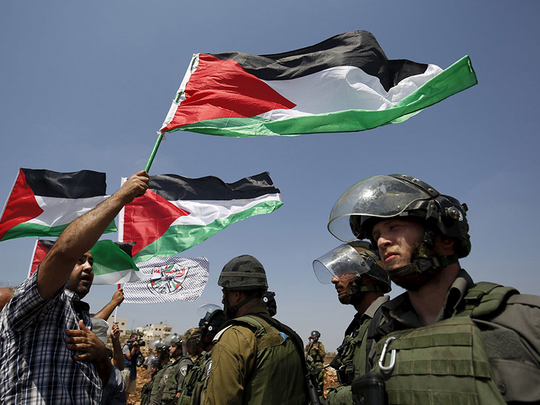
Ramallah: A recently released poll has revealed that Palestinians have little faith in their political leaders and the plunging public confidence has sent the Palestinian political establishment into a tizzy.
The poll also confirmed that there is no clear successor to Palestinian President Mahmoud Abbas if he chooses not to seek another term.
The poll conducted by the Jerusalem Media and Communication Centre (JMCC) indicated that Palestinian political groups and factions, whether in Gaza or the West Bank, have taken a serious hit to their popularity ratings.
In the event Abbas does not run for presidency, a total of 10.5 per cent of Palestinians from territories occupied by the Israeli regime (9.1 per cent from the West Bank and 12.9 per cent from Gaza) said they would vote for jailed leader Marwan Al Barghouti, while 9.8 per cent (7.5 per cent from the West Bank and 13.8 per cent from Gaza) said they would vote for Hamas leader Esmail Haniya, 5.1 per cent (1.3 per cent from the West Bank and 11.3 per cent from Gaza) favoured exiled politician Mohammad Dahlan, and 3.3 per cent said they would vote for Saeb Erekat and another 3.3 per cent chose Doha-based Hamas leader Khalid Mesha’al.
The poll showed a shocking decline in the level of trust in political personalities. The percentage of those who trust President Abbas dropped from 21.8 per cent in March of this year to 16.1 per cent in August. Also the percentage of those who believe that the Palestinian consensus government deals transparently with administration of financial issues dropped from 24.3 per cent in May 2012 to 17.3 per cent in August.
The public was then asked the question: “how would you define yourself — only in one word — in terms of particular affiliation?”
The majority — 32.4 per cent — answered Palestinian; 16.8 per cent said Muslim, 6.8 per cent said Fatah and 2.7 per cent answered Hamas.
Meanwhile, there was a rise in the percentage of those who support holding legislative and presidential elections, even if reconciliation between Palestinian rivals Fatah and Hamas is not achieved, from 34.8 per cent in November 2012 to 58.9 per cent in August. In contrast, the percentage of those who support holding elections only once reconciliation is achieved dropped from 60.8 per cent in November 2012 to 35.8 per cent in August.
Commenting on the poll outcome, Dr Abdul Sattar Qasim, who heads the Political Science Department at Al Najah National University in Nablus, said that the Palestinian public have no faith at all in their political leaders, political parties, and factions. “The Palestinians suffer a serious form of leadership crisis,” said Qasim, who himself will run for the Palestinian presidency.
After the resignation of President Abbas from the helm of the Palestine Liberation Organisation (PLO), it is believed that his PLO successor to be elected by the Palestinian National Council scheduled to convene on September 14 and 15 in Ramallah, will be presented to the Palestinian public as Abbas’ obvious successor.
“This possible successor will surely be one of Fatah’s most senior cell [Fatah Executive Committee],” Dr Qasim told Gulf News. “The PLO has no political weight at all and the Palestinian National Authority [PNA] has the upper hand.”
“There should be a change in the leadership of Palestine through ballot boxes and the Palestinian public only will decide the winner,” he said.












